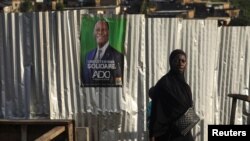The West African nation of Ivory Coast is seeing pockets of violence ahead of an October 31 election, with analysts worried about further clashes. Opposition parties announced a boycott of the election and urged civil disobedience among their supporters. The unrest has raised concerns in the region and brought a halt to tourism.
In 2010 the nation fell into crisis after then-president Laurent Gbagbo refused to concede defeat in elections to Alassane Ouattara, sparking a conflict which killed about 3,000 people.
Since then, the nation has seen a dramatic change. Under his two terms, Ouattara has overseen strong economic growth, as well as security reforms and improvements in livelihoods.
However, instead of stepping down this year, he is running for a third term. He insists that his first two terms do not count toward term limits because the 2016 constitution was not in force at that time. His opponents argue this is illegal and want the Constitutional Council which validated his candidacy dissolved, along with the Independent Electoral Commission.
Christopher Fomunyoh, the regional director for Central and West Africa at the International Democratic Institute for International Affairs, said 2020 was meant to be the consolidation of gains made over the past decade.
He says a stable Ivory Coast is important to all of West Africa.
“It is an important hub for the coastline countries but also the countries in the Sahel which depend on ports in Abidjan in Cote d’Ivoire to be able to export their products," said Fomunyoh. "So if Cote D'ivoire is thriving and doing well economically and is politically stable that would mean very well for several other countries and will also mean very well for the Ivorians.”
Ryan Cummings, the director of the Africa-focused risk management consultancy Signal Risk, said Ivory Coast was seen as a success story in state-building after the 2010 crisis.
Despite the current tensions, he does not think the nation will see a repeat of 2010.
“There were a lot of triggers at that time for the sustained and pervasive unrest we saw after those elections which are absent now, and where elections themselves are no longer seen as zero-sum games than an election outcome which is disputed or controversial won’t necessarily catalyze significant violence that will derail a lot of gains the country has made,” said Cummings.
While Ivory Coast has a diverse economy, the tourism sector has seen gains over the past decade.
Atta Bediako Kodom Jr., who works in a seaside hotel, says the run-up to the election has kept away visitors who were just starting to come back after COVID-19 restrictions.
“It’s affected the businesses," said Kodom. "We are just praying that things will go smoothly during the election so the hospitality and tourism business will come back again.”
Jessica Moody, a political risk analyst especially focused on Ivory Coast, also worries about violence this week.
“I think we will also see quite a lot of people are trying to stay out of the way," said Moody. "I think there are a lot of people who are scared of a repeat of 2010, a lot of people fleeing the areas that are most dangerous. I’ve heard of lots of people getting out of Abidjan, even trying to flee the country actually because they are so scared of what might happen.”
Moody said the ideal way forward is for the government to allow open dialogue, for the election to be postponed and for Ouatarra not to run.
However, she said this wish list was highly unlikely, and that no matter what the results are going to be contested because – in her words -- “no one trusts the institutions that are charged with overseeing it.”




